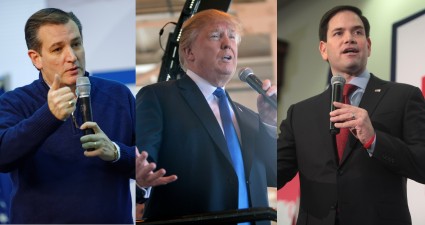
The 2016 GOP primary has three major “Super Tuesdays.” Super Tuesday I was on March 1st, where 632 delegates were awarded — more than a quarter of all delegates.
Super Tuesday II is tomorrow on March 15th. There are 367 delegates up for grabs in Florida, Ohio, Illinois, Missouri, and North Carolina.
Super Tuesday III may end up being pivotal. It will take place on June 7, when five states, including California, will determine the first ballot votes of 303 delegates.
Will tomorrow prove to be “Super Tuesday, Episode II: The Establishment Strikes Back”? Probably not. A cursory look at the delegate math makes it look more like “Revenge of the Trump.”
As it currently stands, the delegate race appears close. Remember, a candidate needs 1,237 delegates to clinch the nomination.
- Donald Trump: 460
- Ted Cruz: 370
- Marco Rubio: 163
- John Kasich: 63
But tomorrow might change those numbers drastically.
Florida — 99 Delegates, Winner Take All
Florida is pretty straightforward. Whoever wins gets all 99 delegates.
Trump has a commanding lead in Florida over Rubio. The last 5 polls (via RealClearPolitics) show Trump leading over Rubio 46-22, 44-21, 43-22, 44-21, and 43-24, with Cruz and Kasich lagging right behind.
If Trump lost Florida, it would be the biggest upset in polling history. It’s just not going to happen.
- Prediction: Trump +99 delegates.
Ohio — 66 Delegates, Winner Take All
Like Florida, Ohio is a winner take all state. Unlike Florida, Trump has a real race on his hands against John Kasich.
The last five polls have been incredibly close — Kasich led two of them, Trump led one, and two were virtual ties. It really is anybody’s game at this point, and it will come down to which campaign can turn out its voters better.
As governor of the Buckeye State, Kasich is right at home in Ohio. It seems likely that he’ll pull this off.
- Prediction: Kasich +66 delegates.
Illinois — 69 Delegates, Winner Take All By Congressional District
Illinois allocates its delegates in a slightly different manner from Ohio and Florida. Illinois grants 3 delegates to the winner in each of its 18 congressional districts, then gives 15 delegates to the winner of the state’s popular vote at large.
This creates a scenario where multiple candidates could win at least a few delegates.
Trump has been leading in Illinois polling so far, although Ted Cruz appears to be surging — the latest CBS News/You Gov poll showed Trump leading Cruz 38-34, with Rubio and Kasich way behind.
My guess is that Cruz will win several downstate congressional districts, Kasich will win IL-10 (a notoriously moderate to liberal Republican district that’s been held previously by now-Senator Mark Kirk and current Rep. Bob Dold), and Trump will win everywhere else.
- Prediction: Trump +51 delegates, Cruz +15 delegates, Kasich +3 delegates.
Missouri — 52 Delegates, Winner Take All By Congressional District
Similar to Illinois, Missouri uses the congressional district format, but instead of 3 delegates, each of Missouri’s 8 congressional districts gets 5. The remaining 12 delegates go to the winner of the state’s popular vote at large.
I don’t know nearly as much about Missouri’s congressional map as I do about Illinois’s map, and there hasn’t been much polling in the state. It’s also an open primary, where Trump has done fairly well in the past. While conventional wisdom seems to have Missouri going Cruz’s way, I believe Trump will pull it off by several points on Tuesday, while Cruz will manage to win three of the more rural congressional districts.
- Prediction: Trump +37 delegates, Cruz +15 delegates.
North Carolina — 72 Delegates, Proportional
There are a lot of delegates to win in North Carolina, but very little attention has been paid to it compared to other states because of its proportional allocation. Recent polling has given Trump a pretty strong lead, and because it is an almost open primary — Republicans and Independents can vote, while Democrats cannot — I expect Trump to do pretty well, winning by double digits.
- Prediction: Trump +33 delegates, Cruz +20 delegates, Kasich +14 delegates, Rubio +5 delegates.
So what’s the final score if all of this comes to pass?
Trump would win 220 delegates, Cruz would win 50, Kasich would win 83, and Rubio would win 5.
Overall projected post-Super Tuesday II delegate totals:
- Trump: 680
- Cruz: 420
- Rubio: 168
- Kasich: 146
With 909 winnable delegates remaining, Trump would need to win 557 of them (61 percent) to clinch the nomination outright, a difficult strategy that would seem dependent on winning most of California’s 172 electoral votes on June 7 (Super Tuesday III!). Cruz’s path to 1,237 would be nearly impossible, and Rubio and Kasich would be mathematically eliminated from contention.
An important note: there will be 112 total unbound delegates that can place their first ballot vote for whomever they want, an unintended “Superdelegate” system which could provide an interesting wrinkle at convention. If Trump gets close enough to 1,237, these unbound delegates are likely to put him over the top.
Jon Schweppe is Communications Director for the American Principles Project.


